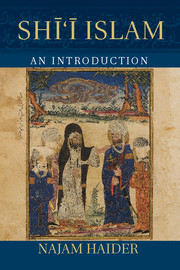Book contents
- Frontmatter
- Dedication
- Contents
- List of Tables and Maps
- Acknowledgments
- Note on the Cover Image
- A Note on Transliteration and Dating
- Maps
- Introduction
- Section 1 Theology
- Section 2 Origins
- Section 3 Constructing Shī‘ism
- 5 Zaydism in the Balance between Sunnī and Shī‘a
- 6 The Weight of Ismā‘īlī Expectations
- 7 Twelver Shī‘ism and the Problem of the Hidden Imām
- Section 4 Shī‘ism in the Modern World
- Appendix Verses Mentioned in the Argument from Qur’ānic Expectations in Chapter 3
- Index
- References
7 - Twelver Shī‘ism and the Problem of the Hidden Imām
Published online by Cambridge University Press: 05 August 2014
- Frontmatter
- Dedication
- Contents
- List of Tables and Maps
- Acknowledgments
- Note on the Cover Image
- A Note on Transliteration and Dating
- Maps
- Introduction
- Section 1 Theology
- Section 2 Origins
- Section 3 Constructing Shī‘ism
- 5 Zaydism in the Balance between Sunnī and Shī‘a
- 6 The Weight of Ismā‘īlī Expectations
- 7 Twelver Shī‘ism and the Problem of the Hidden Imām
- Section 4 Shī‘ism in the Modern World
- Appendix Verses Mentioned in the Argument from Qur’ānic Expectations in Chapter 3
- Index
- References
Summary
The disappearance of the twelfth Imām in 874 plunged the Twelvers (then Imāmīs) into a prolonged state of crisis. It took generations for the community to arrive at a consensus regarding the number of Imāms and the eschatological implications of occultation. This chapter examines the subsequent development of Twelver Shī‘ism, which culminated in the adoption of a modified Mu‘tazilī theological edifice, the development of a rationalist legal system, and the growth of the authority of scholars. Specifically, it documents three seminal transformations in Twelver Shī‘ism: (i) the rise of Mu‘tazilī theology and systematic legal reasoning in the aftermath of the Imām's occultation, (ii) the far-reaching impact of Safavid patronage of Twelver Shī‘ism in Iran beginning in the sixteenth century, and (iii) the victory of rationalist (uṣūlī) over traditionist (akhbārī) legal discourse late in the eighteenth century. Although the chapter is organized chronologically, there are places where thematic concerns require a return to the preoccultation period.
The Implications of Occultation
Before 874, the forebears of the Twelver Shī‘a had a visible and (mostly) accessible Imām who provided guidance on uncertain or ambiguous issues. As detailed in Chapters 1 and 2, the Twelvers viewed the Imāmate as a necessary consequence of the end of prophethood. The Imām's interpretations were considered authoritative, and they guaranteed that the Muslim community remained on the proper path. This section examines the devolution of authority in the postoccultation period from an Imām to a class of religious scholars who relied primarily on rational discourse.
- Type
- Chapter
- Information
- Shi'i IslamAn Introduction, pp. 145 - 166Publisher: Cambridge University PressPrint publication year: 2014

